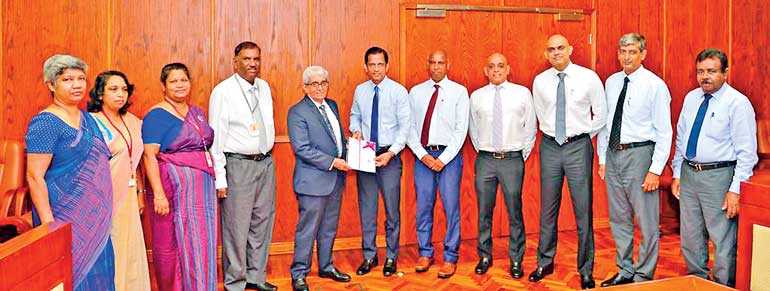Wednesday Feb 18, 2026
Wednesday Feb 18, 2026
Tuesday, 20 April 2021 00:25 - - {{hitsCtrl.values.hits}}

Central Bank of Sri Lanka Governor Prof. W.D. Lakshman, Deputy Governor T.M.J.Y.P. Fernando, Assistant Governor J.P.R. Karunaratne, SNBFI Dept. Addl. Director R.M.C.H.K. Jayasinghe, SNBFI Dept. Additional Director A.P. Liyanapatabendi at the handing over event of ‘Code of Conduct of Licensed Finance Companies Sri Lanka’ by FHA Council members at the Central Bank headquarters on 18 March
The Finance Houses Association of Sri Lanka (FHA) the apex body of all registered finance companies has announced the introduction of its revised Self-Regulation Code which has been voluntarily practiced by member companies over a long period of time, but has to be adapted to changing times.
The timely revisions to the Code were effected with a view to maintain the highest standards on strategic and business operations in Sri Lanka’s Non-Banking Financial and Leasing Institutions (NBFI) sector.
The FHA collective of 39 Licensed Finance Companies (LFCs) is the driver of financial inclusion of Sri Lanka’s MSME sector which has a large footprint in the Bottom of the Pyramid segment of the country. The MSME sector is no less than the backbone of Sri Lankan economy involving over 70% of businesses in Sri Lanka, providing employment for 45% of the labour force and generating 52% of GDP.
Titled ‘Code of Conduct of Licensed Finance Companies Sri Lanka’ the updated instrument was handed over to the Governor of Central Bank of Sri Lanka Prof. W.D. Lakshman and Bank’s officials by FHA Council members on 18 March at the Central Bank premises.
FHA Chairman Niroshan Udage elaborated: “FHA’s time tested gentlemen’s agreement that was codified some time ago needed revisions and updates as per the requirements of today’s changing times.
The overall objectives of updating the Code were to comply with all current regulatory and legal requirements while adhering to industry best practices. We take humble pride in the fact that the Code was not imposed on our sector by any authority but was self-introduced by all FHA members on their own will, which demonstrates the members’ strong commitment to sectoral integrity and their social responsibility.”
On 18 March members of FHA also handed over their Sustainability Mandate to the Governor of Central Bank Prof. W.D. Lakshman and top officials of the Bank.
“The purpose of the Sustainability Mandate is to serve as the guideline for the LFCs to integrate sustainability principles holistically into their businesses, enabling sustainable value creation through their own financing approaches, in line with defined sustainability guidelines that would ultimately contribute towards national sustainability agenda and UN Sustainable Development Goals,” said Chairman Niroshan Udage. “As a growing number of financial institutions in the world are adopting policies, systems, and lending practices that reduce the environmental impact of their operational footprint, it is time Sri Lankan LFCs actively follow suit. We are making sure that financing practices for economic development shall not come at the cost of our ecosystems and our future generations,” added Chairman Niroshan Udage.
Romani de Silva, speaking on behalf of the FHA sub-committee that overlooks sustainability said: “Adopting the United Nation’s Sustainable Development Goals (SDGs) would be significant to every finance company operating in Sri Lanka’s NBFI sector.
The good news is that many members of FHA already subscribe to at least three SDG guidelines by default; the SDGs are ‘No Poverty’, ‘Zero Hunger’ and ‘Good Health and Well Being’ through their activities in serving customers at the base of the pyramid.
Therefore, Sri Lanka FHA has ‘already arrived’ towards SDGs to some extent. Such facts as our member companies already serving the MSMEs and the Bottom of the Pyramid market and some even investing in Sri Lanka’s Social Enterprises also testifies to FHA members’ active engagement with Sustainability. I further believe that espousing global sustainable value creation initiatives by our member companies would be a viable way to adopt best practices in this regard.”